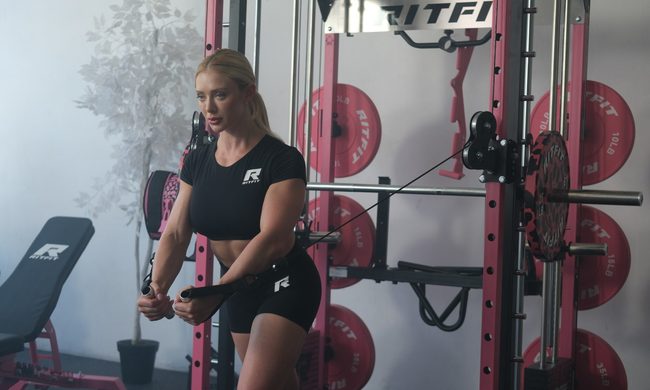If you’ve ever finished a tough workout or maxed out on weight with a set of reps, you’ve likely experienced your muscles shaking. But does shaking muscles during weights and other exercises mean you’re getting stronger and building more muscle mass? The experts say not necessarily.
One expert says shaking during a workout just means you aren’t giving your body enough time to recover. “When you feel really fatigued quickly, and you’re really pushing yourself and it feels awful, it’s the fact that you didn’t give your neuromuscular system enough rest in between,” explains Heather Milton, CSCS, a board-certified clinical exercise physiologist at NYU Langone’s Sports Performance Center told Well and Good.
Why do muscles shake?
Shaking occurs because of muscle fatigue. This happens as a result of our nerves and nutrients. Nerves, according to Science ABC, carry signals from your spinal cord to your muscle groups. “Our nerves are accustomed to carrying signals dictating the generation of muscular force that is much less than the maximum force our muscles can generate or bear,” Mahak Jalan wrote. “When we lift weights, or exercise, the muscles need to generate a higher amount of force.” Regular exercise or weight lifting will train your muscles to respond to more force which happens over time.
Not having enough nutrients to support your muscles is another common reason for shaking to occur. This can happen when you don’t intake enough water or nutrients and your muscles become dehydrated and fatigue sets in.
How to prevent muscles from shaking
Since we know muscle shaking doesn’t equate to muscles getting stronger or improving strength, it can become more of an annoyance that you want to prevent in future workouts. One way to do this is by decreasing the intensity of your workout. This means choosing lighter weights or reducing the number of reps you perform. Research published in 2016 in the journal Experimental Physiology said you should rest for “two to three minutes between exercise sets.”
Make sure you are staying hydrated and replacing the water lost from sweating by drinking water during and after your workouts. You can also eat a snack high in carbs before a workout or drink liquids with electrolytes in them to replace the nutrients lost during a sweat session.
A few tips and tricks
You also may notice your muscles shake if you’re engaging a new set of muscles than you’re used to. If you usually run or walk and decide to take up yoga, you may notice shaking in muscle groups like your core or shoulders because you haven’t relied on these muscle groups for a while. Be kind to your body and don’t overdo it right out of the gate. Muscle shaking can also occur if you don’t give your body enough time to rest — and this means getting enough sleep as well. If you know you’re planning a tough workout, get at least eight hours of sleep the night before.
Ego can also come into play. “As a personal trainer, I push my clients to shake, and then once they reach that point, back off,” Aaptiv trainer Jaime McFaden said. “Some want to push past the shaking part, and I advise them not to do that, as it compromises form and puts you in a position for muscle imbalance and potential injury. That [desire to shake] can be the unfortunate result of someone’s pride.”
We all want to push ourselves to be the best we can be. Unfortunately, when it comes to building strength and muscle mass, slow and steady may win the race. It can be hard to not increase weight and reps every time you workout, but muscles, like the rest of your body, need rest in order to regenerate and perform at their peak performance. If you notice your muscles continuously shaking, it may be best to back off, take a few minutes, drink some water, and give your body a chance to recover.
As with anything, if you find your muscles shaking more than most or feel the shaking is getting more severe, go and visit your primary care physician to make sure there are no other possible causes that would be concerning.




